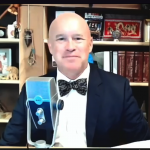There are many rumors about an impending Global Currency Reset (GCR). I’ve found Lynette Austin from ITN Trading to be very plain-spoken and straightforward in the past. Here, she answers questions from YouTube followers about the GCR on April 6th:
1) “What does a Global Currency Reset look like? What are the indications and warnings that it’s about to happen and what happens when it comes? Are there any historical references for this?”
Lynette responds on the fly, “This will be the first time in history that we will actually have had a complete global system reset.” She then goes on to explain how the financial upheavals of the 20th century were more of a gradual shift away from the Gold Standard to debt-based currencies, a process which started during the Great Depression of the 1930s and which culminated the late 1970s.
She notes that around any reset there’s a tremendous amount of chaos so, “If we think back to the ’70s, what was going on then? You had the Vietnam War, you had the protests. My sister was billy-clubbed at Kent State; you had the Oil Embargo, you had 37% official inflation, you had the Stock Market imploding, Women’s Lib, the Civil Rights Movement…so, they use these things to distract you from the real intention…so, you’ll see a lot of chaos.
“Right now, though, too, because everything is so financialized…these markets are really inside of a very narrow range. That means that they’re super rigid. So, all indications are, in my opinion as a technician and a historian is that we’re very close and what we’re seeing right now in the market, with corporations…[they] don’t even make any money and their market value is $35 billion and they don’t know that they’re ever going to make any money – even Amazon…Amazon drove a lot of companies out of business they didn’t have to make money – but if you’re a Mom-and-Pop shop, you’ve got to make money – so when you see things that are super-insane, like they are right now, that they absolutely defy all logic – that’s the indication.”
The next question is:
2) “What do Central Banks do when they peg? Do they purchase other entities’ currencies or do they print money or something else?”
Lynette replies, “It’s a combination of the two but first, they make a commitment to that peg…Iceland is now thinking about pegging to the euro-dollar, so what they do is they make that commitment to maintain…some certain level against another currency and they have to buy and sell their currencies or the other currencies to maintain that…”
Next question:
3) “If the Dow is made up of individual stocks…why did every single stock crash in 2007 to 2009, when the Dow crashed?”
Lynette’s answer: “That’s a really good question. So, actually yes, the Dow is made up of individual stocks but what we’ve been going towards for a very long time are indexes. So, what was happening was people were selling their mutual funds, the ETFs hadn’t really fully kicked into gear yet but the ETFs, those are more indexes.
“Fewer and fewer individual people actually own individual stocks and it’s not even every stock in the Dow that has run-up; it’s some key ones, like Apple or Amazon, etc. but when there is a sell-off – because I was there in ’87 and I know what that looks like and I know what that feels like – panic. So, when people panic, they just liquidate everything…So, you might have a dog stock that you want to get rid of but you may have to sell a better stock to get out of it…
“But because everybody is so much in indexes today, [when] they’re selling off an index, it pushes everything down simultaneously…assuming that there is a buyer…
“This next time, there are no buyers, because back in 2002, 2007, 2008, the banks were still market-makers, which means they would go in and put a floor underneath things or at least attempted [to do so].
“Well, they’re out of that business now so, there’s nobody to put a floor underneath.”











Truth is God and reality is bent by mankind. The crooks can not win against God.
I wish she’d explain the terminology better.
Index. What is an index? From the context–A group of stocks carried by a specific investment company like those that make up IRAs? Market Maker–Floor. What’s a floor? A bunch of money that guarantees the investment does not drop any lower than a specified number so big corporations/banks do not lose money?
Even though I think she’s sincerely intent on simplifying things, I think you have a point. “Index”, in this case means financial products, like mutual funds – you can buy shares in the NYSE, which represents all of the traded stocks. That’s what she means. Meanwhile, the few that move, like Apple and Amazon are these, where only the Digerati in SF/SJ and other smartypants get to live high off these hogs.
Here’s more support for what she’s saying from Stansberry Digest: “The last several years have seen the rise of companies that are experts at exploiting technology to reduce labor costs. Free capital and zero per-unit marginal labor costs equals a whole new form of capitalism that’s genuinely unlike anything the world has ever seen before.
“These are companies with massive scale, massive sales growth… and virtually zero profits.
“Amazon (AMZN) is the most famous example. In just the last three years, the Internet retailer’s revenues have almost doubled (from $80 billion to $140 billion). Meanwhile, its profit margins haven’t budged. They remain less than 2%. With this kind of scale and almost no profit, Amazon has been able to grow faster and faster, into all kinds of new businesses. The company doesn’t have to worry about cash flows to power investments into new lines of business because, after all, capital is free.
“So even though Amazon has only earned profits of $3 billion over the last three years, it has been able to invest $17 billion into growing its core business and building new businesses.
“I’ve never seen a company of this size borrowing such a high multiple of its annual net income to spend on capital investments. And I’m pretty sure nobody else ever has either. Just think for a minute about this…
“On revenues of $320 billion… Amazon has only earned $3 billion in net income. Meanwhile, it has spent $17 billion on investments in just the last three years. It borrowed $7.5 billion in the last two years to help finance these investments.
“The result of these kinds of ongoing massive investments is a company with a market cap of close to $500 billion… that has a lifetime, total combined, retained earnings of less than $5 billion. And since it has never paid a dividend, those are the company’s total lifetime earnings.
“It’s a for-profit company that doesn’t intend to make a profit. And it doesn’t have to because there’s unlimited amounts of additional investment capital, available essentially for free.
“Sounds great… for consumers. But is it good for investors? Is it good for our economy?
“It hasn’t been good for IBM. In the face of competition from Amazon’s Web Services business (its cloud offerings), IBM’s revenues declined for 20 straight quarters. IBM can’t shed per-unit labor costs because it’s stuck with tens of thousands of legacy engineers.
“It hasn’t been good for the U.S. retail industry. Amazon can afford to build unlimited amounts of new warehouses and distribution space. Again, capital is free. But retailers can’t possibly compete on per-unit labor costs. They’ve got to staff each store.
“And it’s not going to be good for U.S. media companies. By tying entertainment content to its “Amazon Prime” memberships, Amazon is pointing a gun directly at the head of every media/entertainment company in the U.S. Good luck competing with a $500 billion firm that doesn’t have to bother with profits and has the world’s best online technology.
“But… is that good for our economy? What happens when investors realize, much to their chagrin, that Amazon isn’t ever going to make any money? What will happen when investors realize that Amazon’s core competitive advantage is that it will never make a profit?
“What’s the point of capitalism again?”
Geez! You are well versed in it. Thanks.
Eventually, when Amazon has cornered the market. When it has eliminated most of the competition. They will raise prices and make a resounding profit. Then any time a segment of the market tries to gain a foothold, by selling cheaper, Amazon will undercut them. Thus Amazon will control a segment of the market to such an extent, that even Walmart will struggle to stay in business. It is sad that ‘those’ in the ‘know’ are not openly discussing this eventuality. Instead they are acting as if it is the intent of Amazon to remain profitless forever. They make that claim or reach that conclusion, without a shred of proof, other than that has been the option thus far. Absurd conclusions, by the supposed experts. Go figure.
Just a different take.
Even though I had a federal license to sell stocks and bonds, I never comprehended the market, so I am not a qualified commentator here. I agree with Bernie Madoff, it’s a Ponzi scheme.
I disagree that there are no crisis buyers now.
Lets take the metals market. Why are they priced at $….? The investment bankers set the price mostly with paper metal shares and buy/sell orders. They make money by manipulating the prices and trading according to the market they manipulated. These same bankers manipulate currency and some like the Rothschild family for instance, buy and sell nations by manipulating their currency value. Having a metals based currency merely complicates the process a little. Either way, if central bankers are in control of the money supply, they are going to collect usury on the borrowed currency with what amounts to no risk for them.
In one sense everything and everybody is a commodity to international investment bankers such as the Rothschild family which is likely the richest and most well organized central banking family of all.
There may be no apparent buyers now, but there are potential buyers who will or will not step in according to their judgment is best for their long term objective of central global government. They’ve already got a central global banking network which makes possible central global commerce. “Nationalism” to them is like an anathema, it must be stopped. and they may well decide to not step in and let everything collapse if it benefits them the most.
This is the spiral Woodrow Wilson, the worst president in our nation’s history, put our nation into.
I am always amazed at HOW complicated financial people (Bankaholics) love to “Complicate” something that could be made VERY simple…Obviously for THEIR interest.
ALL this RV BS is sooooooooooooooooooo STUPID! All that needs to be done is FIX VALUE OF ALL CURRENCY TO A SINGLE PRICE BASED OFF OF PRECIOUS METALS (Any of them)…Then EVERYONE worldwide would have to settle all financial matters based off the agreed FIXED price!
ONLY the bankoholics want all this “Confusion” so that They can exploit it for their gain or interest.
BUT, First…They have to “Understand” that ALL MANKIND ARE EQUAL BE-INGS…and Have a RIGHT to be “Worth” THE SAME!
Until WE REMEMBER WHO WE ARE…NOTHING WILL WORK!
This is WHY I look forward to “Money” becoming redundant soon in our future…AFTER THE EVENT.
The “Stock Markets” are nothing more than MASSIVE Fraud and MUST BE SHUT DOWN FOREVER!
I would LOVE the monetary system to become obsolete. It’s a scheme for control and power. However, that happens I’m ALL-IN. It’s slavery. Some get all freaked-out about that statement but nothing is more true.
Remember…TRUTH IS and WAS, Always SIMPLE…Lies & cover-ups on the other hand are always complicated…TRUTH will always win.